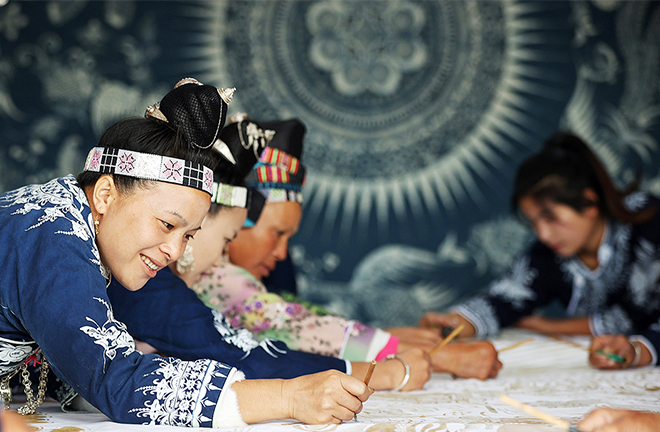GDI hailed as boon to world development

Women do wax dyeing at a poverty alleviation workshop in Danzhai County, Qiandongnan Miao and Dong Autonomous Prefecture, Guizhou Province, on Oct. 7. Through various measures, China has contributed significantly to global poverty reduction. Photo: CFP
Academics from China and abroad spoke highly of the Global Development Initiative (GDI) at the China-Europe-America Think Tank Forum, which was held under the theme of “Global Governance: The Global Development Initiative and a Community with a Shared Future for Humanity,” in Beijing on Sept. 21–22.
Timely proposal
The GDI was proposed by Chinese President Xi Jinping in his statement delivered via video at the general debate of the 76th session of the United Nations General Assembly in 2021, with a vision to improve the well-being of all mankind. Over the past year, the GDI has taken root and become another important public good and cooperation platform provided by China to the international community.
The GDI aims to build a global development partnership to achieve stronger, greener, and healthier global development. Du Zhanyuan, president of China Foreign Languages Publishing Administration (CFLPA), said that development is the key to solving various problems. It is precisely by adhering to development as a priority that China accomplished—ten years ahead of schedule—the poverty reduction target set out in the United Nations 2030 Agenda for Sustainable Development. Only by adhering to the priority of development can all countries in the world, especially developing nations, escape the gloom of poverty and conflict, and create a bright future in which the people are well-off and all countries are prosperous and strong.
The GDI is a multilateral cooperation plan that China has provided to the world based on its own practical experience and the development needs of other countries. It advocates for prioritizing development on the international agenda, pointing the direction and path for implementing the United Nations 2030 Agenda for Sustainable Development while jointly addressing global challenges, Du said.
Seeking peace, development, cooperation, and mutual benefits is the common aspiration of all countries in the world, and it has become an irresistible trend of the times. Noting the current tense international environment and sluggish global economy, Romano Prodi, former president of the European Commission, emphasized that peace and development have become shared goals of all countries. Global cooperation is crucial to the future of mankind. Meeting the needs of all parties, the GDI is an important public good open to the world and has made important contributions to promoting global common development.
At the forum, David Gosset, founder of the China-Europe-America Global Initiative, introduced and released “The Global Development Initiative in the Context of Global Governance and of ‘a Community of Shared Future for Mankind.’” He predicted that as the COVID-19 pandemic rages, more people will fall back into extreme poverty, and if this trend continues, the goal of eradicating poverty by 2030 will not be achieved. In this context, the GDI echoes principles articulated in the United Nations Charter and the Universal Declaration of Human Rights, and it aims to respond responsibly to the pressing challenges facing the international community. Gosset believes that the GDI is a supplement to, and improvement of, the existing global governance system, and does not contradict the practices of other countries within the field of development.
Contributing Chinese wisdom
The GDI is another major China-proposed initiative following the Belt and Road initiative (BRI), and another vivid practice of China’s endeavor to build a community with a shared future for mankind. Scholars believe that it can contribute Chinese wisdom and solutions to development problems.
Poverty is a longstanding phenomenon in the development of human society. How to better allocate poverty alleviation resources among the poor is a worldwide issue. In recent years, China’s achievements in poverty reduction have attracted worldwide attention. From a recipient country to a donor country, from a poor, underdeveloped country to a role model for poverty reduction, China has contributed significantly to the global poverty reduction cause.
Zhao Kejin, vice president of the Institute for Global Development at Tsinghua University, shed light on “Chinese-style poverty reduction.” Especially since the 18th CPC National Congress in 2012, the Chinese government has put forward diverse concepts alongside innovative systems in order to win the battle against poverty in an all-around manner, such as the people-centered philosophy and targeted poverty alleviation, advancing poverty reduction by drawing on the joint efforts of government, society, and the market. It adhered to the government-led strategy, implemented the development-oriented poverty alleviation policy, and strengthened its leadership responsibility system for poverty alleviation and development. Moreover, it built a “three-in-one” poverty alleviation model where government-sponsored projects, sector-specific programs, and corporate and societal assistance supplement each other, and mobilized the whole society to facilitate poverty alleviation.
The solution to poverty can only be achieved through development, said Chen Wenling, chief economist of the China Center for International Economic Exchanges. Although China has eradicated absolute poverty, many countries still face the task of poverty alleviation. Based on its experience, China launched the BRI and introduced the GDI to the world, committing to helping and joining hands with related countries to achieve poverty reduction goals.
The conference was co-organized by the Academy of Contemporary China and World Studies at the CFLPA, the China-Europe-America Global Initiative, and other institutions.
Edited by CHEN MIRONG

 PRINT
PRINT CLOSE
CLOSE